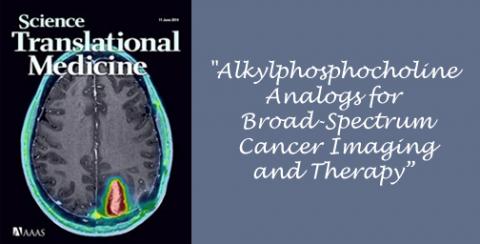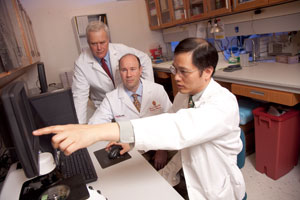 “Many consider targeted or molecular imaging to be the optimal way to image cancer. Weichert and colleagues feel differently: Uptake of certain small molecules by all cancer cells can give a broad view of cancer, and perhaps also treat it. These small molecules are alkylphosphocholine (APC) analogs, which are taken up preferentially by cancer cells—as compared to, for example, fibroblasts—via plasma membranes and transported into the cells by lipid rafts. The authors tested the uptake of radiolabeled APC analogs in vitro and in vivo in animals in 57 different spontaneous and transgenic tumors, of both human and rodent origin. Because of the well-established efficacy of radiotherapy, the authors demonstrated that the APC analogs could be used to not only visualize tumors but also kill them. Translating this to cancer patients, Weichert et al. showed preliminary preferential uptake of a radiolabeled APC analog in brain tumors. These broadly applicable imaging and therapeutic APC-based agents have been tested in dozens of different human cancers, and preliminarily in people, and are now well poised for further translation to clinical trials.”
“Many consider targeted or molecular imaging to be the optimal way to image cancer. Weichert and colleagues feel differently: Uptake of certain small molecules by all cancer cells can give a broad view of cancer, and perhaps also treat it. These small molecules are alkylphosphocholine (APC) analogs, which are taken up preferentially by cancer cells—as compared to, for example, fibroblasts—via plasma membranes and transported into the cells by lipid rafts. The authors tested the uptake of radiolabeled APC analogs in vitro and in vivo in animals in 57 different spontaneous and transgenic tumors, of both human and rodent origin. Because of the well-established efficacy of radiotherapy, the authors demonstrated that the APC analogs could be used to not only visualize tumors but also kill them. Translating this to cancer patients, Weichert et al. showed preliminary preferential uptake of a radiolabeled APC analog in brain tumors. These broadly applicable imaging and therapeutic APC-based agents have been tested in dozens of different human cancers, and preliminarily in people, and are now well poised for further translation to clinical trials.”
(Article) “New Tumor-Targeting Agent Images and Treats Variety of Cancers” UW SMPH article

